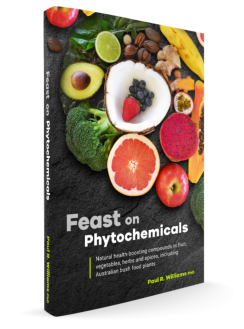About this website
This site is dedicated to improving our understanding of phytochemicals, especially their capacity to contribute to our long term health.
Long-term health
Feast on Phytochemicals aims to help explain why eating a wide range of fruit, vegetables (including legumes and whole grains), herbs and spices, are so important for our well-being. The obsession for spices in past centuries, as flavouring and medicine, speaks volumes for our passion for phytochemicals. Their spicy flavours are provided by phytochemicals, such as piperine in pepper.

Raising Awareness
This website and the associated book “Feast on Phytochemicals” provide information about phytochemicals to raise awareness of their benefits and for general discussion. They do not constitute medical or dietary advice, nor should be seen as a replacement for that advice. The author of this site, Paul Williams, is a plant scientist with some biochemistry training, not a medical doctor, nutritional scientist or dietician. While great care has been taken in researching and developing this website and associated book, neither the author or publisher accept any responsibility or liability for decisions or actions taken as a result of any information, statement or advice, expressed or implied, in this website or associated book. Please make your own detailed inquiries and obtain professional medical and dietary advice before making any decisions based on information contained here. All plants and plant products should be sourced from a reputable supplier, not from the wild.
Find out more…
Phytochemicals are typically grouped into the following broad categories, with many vitamins (such as vitamin C) also considered phytochemicals… Read more
The phytochemicals in the plants we eat provide important health benefits through their antioxidant and anti-inflammatory properties… Read more
Australia is home to a huge diversity of significant plants and has ancient biological links with Africa, India and South America, and… Read more
How plants are grown affects the concentration of phytochemicals. Cultivation techniques can be refined to enhance the… Read more
Buy the Book
$30.00 + P&H
This book brings the science of plant compounds to people interested in healthy eating and nutrition. It interprets the latest scientific research about health promoting phytochemicals that are supplied to us in common fruit and vegetables (including nuts, legumes and whole grains), herbs and spice.


